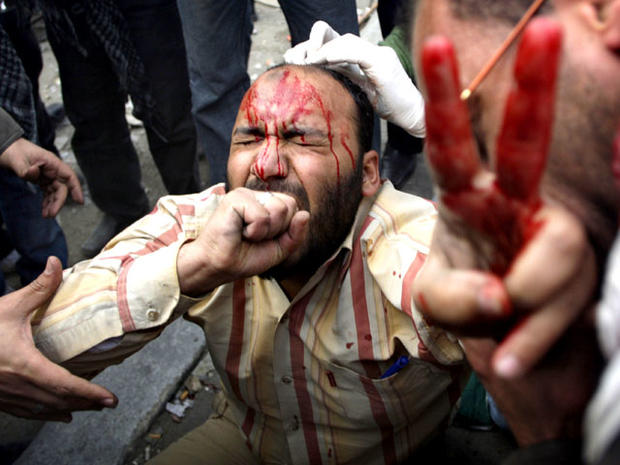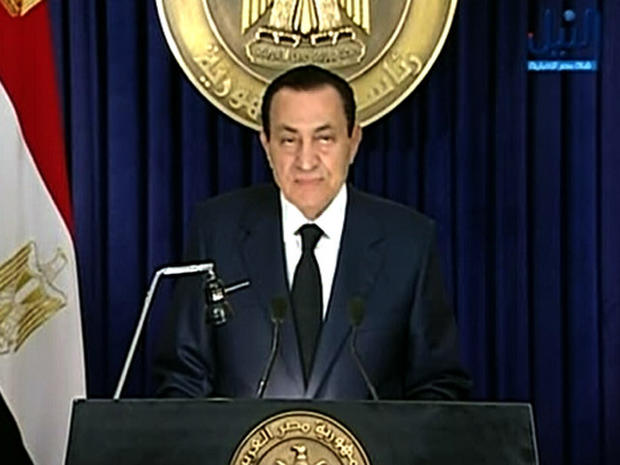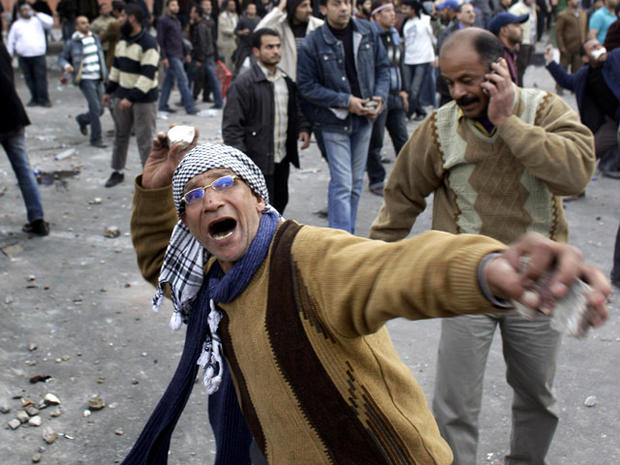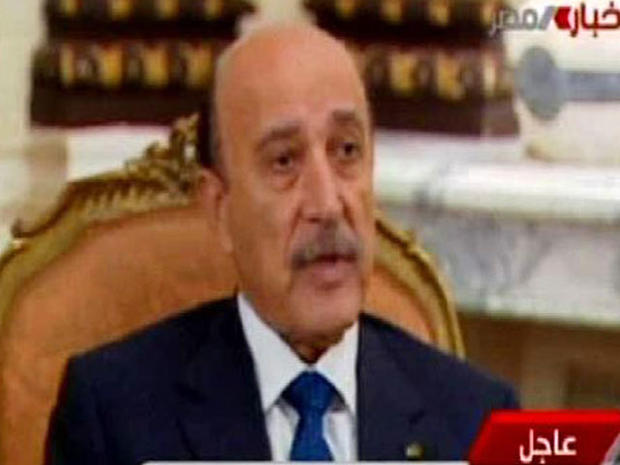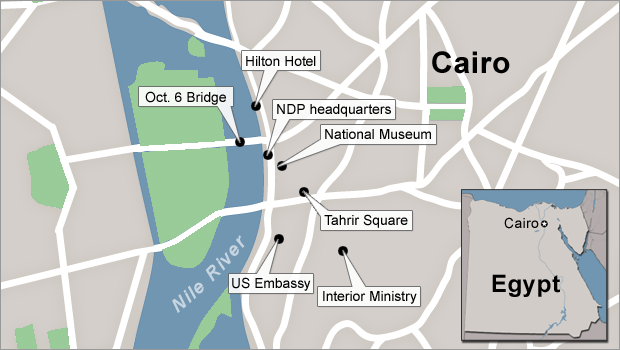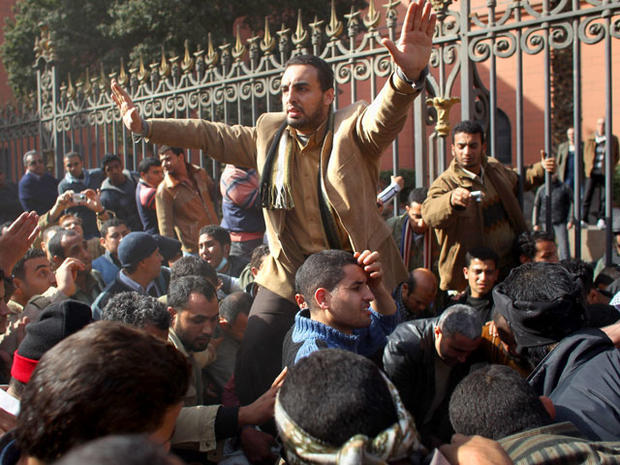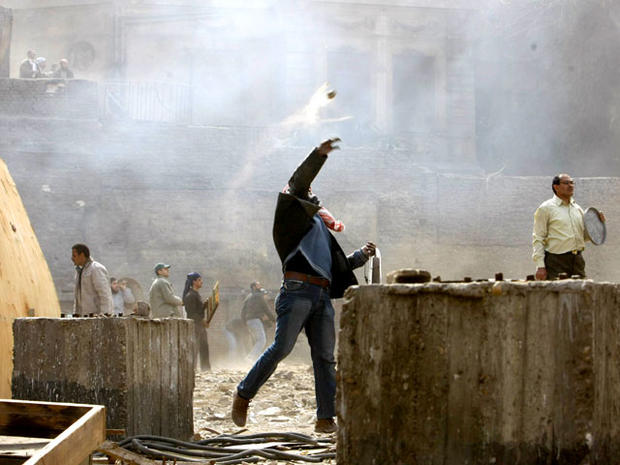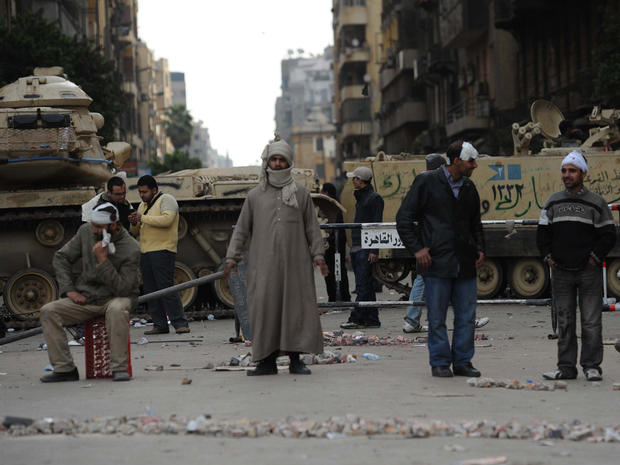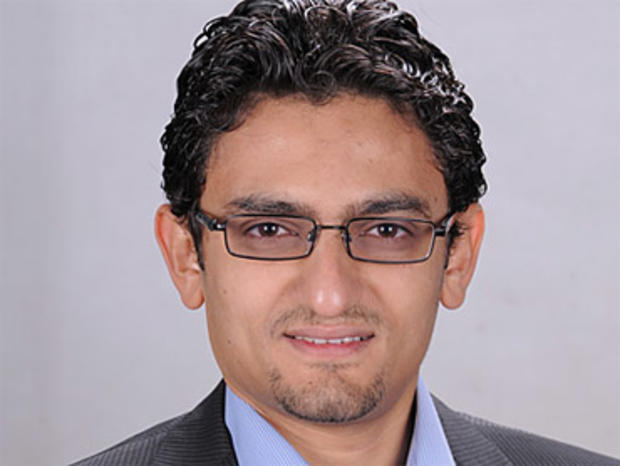Live Blog: Egypt in Crisis, Day 10
For the tenth straight day, protesters are swarming the streets of Cairo demanding President Hosni Mubarak step down and end his 30-year rule. Our blog covers the latest news out of Egypt. (FYI: Egypt is seven hours ahead of the time posted, which is the eastern U.S. time.)
Day 11 Coverage of Egypt in Crisis
Day 9 Coverage of Egypt in Crisis
Complete Coverage: Anger in the Arab World
9:00 p.m. The New York Times is reporting Thursday night that the Obama Administration is discussing with Egyptian officials a proposal for Hosni Mubarak to resign immediately as President of Egypt with Vice President Omar Suleiman heading a transitional government.
National Security Council spokesman Tommy Vietor said the White House is talking with Egyptian officials about multiple options. Read the CBS News story here.
(Watch at left)
The Middle East already has the highest jobless rate in the world at more than 10 percent. It's four times as high among young workers. Governments need to create 100 million new jobs in this decade to avert mass unemployment.
6:39 p.m. ABC News has compiled a list of journalists who have been threatened or detained in Cairo. The list includes CBS Evening News anchor Katie Couric and CBS News Chief Foreign Affairs Correspondent Lara Logan.
5:58 p.m. Al Jazeera reports that the Arab League is calling for an inquiry into the events that took place in Tahrir Square on Wednesday.
5:55 p.m. The BBC reports that Canada says it's chartering planes to get its citizens out of Egypt and that it recommends Canadian citizens in Egypt leave.
5:24 p.m. Friday, Feb. 4, 2011, is the "Day of Departure." Anti-Mubarak protesters, dissatisfied with his Feb. 1, 2011, announcement that he will remain in power until elections are held in September, have given him until Friday to leave office. They've said they will march to Mubarak's palace in a last-ditch attempt to force the president out of office. Read about the Day of Departure here on CBSNews.com.
4:50 p.m. Reuters reports that Egypt State TV ran a report that Egypt's Prime Minister Ahmed Shafiq has told the interior minister not to obstruct peaceful marches on Friday.
4:32 p.m. ET: In an exclusive interview with CBS News, a Cairo-based blogger whose site was yanked down by the government described being attacked and beaten by a pro-Mubarak mob before getting arrested. Mahmoud Salem, 29, who writes the blog Sandmonkey.org, said he was stopped by "pro-Mubarak goons" while trying to deliver medical supplies. Police took away his car keys and phone, letting crowds attack the group of people he was with and destroy his car.
4:25 p.m. ET: Secretary of State Hillary Clinton on the situation in Egypt: "We condemn in the strongest terms attacks on reporters. This is a violation of international norms that guarantee freedom of the press. (It is) unacceptable under any circumstances. We also condemn in strongest terms attacks on protesters, diplomats. The Egyptian government must demonstrate its willingness to allow journalists to work. Free and fair elections, that is essential."
3:58 p.m. ET: Raw video from the Associated Press of the violent clashes today in Cairo:
3:39 p.m. ET: Washington Unplugged interview with The Atlantic's Jeffrey Goldberg about how the Egypt crisis could have huge consequences for the U.S.:
3:37 p.m. ET: President Barack Obama was warned about instability in Egypt at the end of 2010, Reuters reports. "We have warned of instability. We didn't know what the triggering mechanism would be for that. And that happened at the end of the last year," said Stephanie O'Sullivan, a current CIA official nominated to become the principal deputy director of national intelligence.
3:26 p.m. ET: Human Rights Watch researcher Daniel Williams was swept up in the arrests at the Hisham Mubarak Law Centre that also ensared Amnesty International representatives, reports Foreign Policy magazine. The Foreign Policy report states:
"On Thursday morning, a joint squad of police and military personnel in their respective uniforms raided the Center, interrogated all inside, and forcibly transported dozens of Egyptians and foreigners alike to an unknown detention facility, where Williams remains now. Following the on-site interrogations, the police and army personnel accused all the Egyptians working at the Law Center of being affiliated with Hamas and accused all the foreigners at the Center of being affiliated with Israeli intelligence service Mossad."
3:18 p.m. ET: Amnesty International states on its website: Two Amnesty International representatives have been detained by police in Cairo after the Hisham Mubarak Law Centre was taken over by military police this morning. The Amnesty International staff members were taken, along with Ahmed Seif Al Islam, Khaled Ali, a delegate from Human Rights Watch and others, to an unknown location in Cairo. Amnesty International does not know their current whereabouts.
3:11 p.m. ET: Embattled Egyptian President Hosni Mubarak said in his first interview with an American broadcast network since massive protests across his country have called for his resignation that he would leave office but is refusing because then the country would sink into chaos. Mubarak also told ABC News' Christiane Amanpour in an interview published Thursday that President Obama doesn't "understand the Egyptian culture and what would happen if I step down now."
3:10 p.m. ET: ABC News' Christiane Amanpour tweets: "Told Egypt's Info Minister about dangers for press. He promised he'd send message via state TV asking ppl to leave foreign journalists alone."
2:36 p.m. ET: Save the Children, a London-based international non-profit, put out a press release today expressing concern about the role of children in the rising violence in Egypt. The release states:
"Save the Children is deeply concerned at reports that children have been drawn into violent clashes at political protests in recent days. In the absence of regular security patrols, local popular committees have set up checkpoints to protect their communities. Save the Children is concerned about the safety of children helping to defend their neighborhoods from criminal gangs. Boys as young as twelve have been joining their fathers, brothers and neighbors on overnight vigils to stop looting and other criminal activity, but risk becoming victims of violence themselves."
2:19 p.m. ET: The Committee to Protect Journalists has called the attacks in Cairo on reporters part of an "orchestrated effort" led by President Hosni Mubarak himself. CPJ Executive Director Joel Simon stated in a release:
"The systematic and sustained attacks documented by CPJ leave no doubt that a government-orchestrated effort to target the media and suppress the news is well under way. With this turn of events, Egypt is seeking to create an information vacuum that puts it in the company of the world's worst oppressors, countries such as Burma, Iran and Cuba. We hold President Mubarak personally responsible for this unprecedented action."
2:12 p.m. ET: Reuters is reporting that at least 10 people have been killed today in fighting in and around Tahrir Sqaure. The health minister said yesterday that six had been killed in the protests and more than 800 wounded. The death toll to date of clashes between anti-government demonstrators and Mubarak's supporters is unclear.
1:56 p.m. ET: Freelance photojournalist Andrew Burton wrote an account of getting attacked in Cairo yesterday by pro-Mubarak supporters on his blog:
"Suddenly 50% of the crowd started attacking me - kicking, punching and slapping. The other 50% (anti-Mubarak supporters) quickly encircled me to protect me. Five or six guys surrounded me and took many more blows than I did. We were headed towards an Egyptian army tank and when we hit it, the men positioned me with my back to the tank, squatting down. People continued to kick, punch and grab at cameras. Soldiers standing on top of the tank were waving pistols and screaming. My shirt was ripped from my back, hands went into my pockets, the men protecting me were screaming, "You are safe, we are here for you, we will get you out of this." I only escaped when the soldiers on top of the tank literally ripped me out of the crowd, lifting me by the armpits. I was dumped head-first inside the tank."
1:25 p.m. ET: Britain's Channel 4 News reports: "Makeshift field hospitals have been set up to treat the wounded on the streets surrounding Tahrir Square which has become the focus of clashes in the capital. Pictures have emerged of people with severe head and body injures being stitched up by volunteers. Others appear to show people with teeth knocked out, bloodied eyes and hand injuries. Volunteers, many with no apparent medical experience, have been treating minor injures on the streets."
1:11 p.m. ET: Wired.com reports: "Egypt's crackdown against anti-government protesters has ensnared at least four members of the April 6 Youth, a dissident movement organized largely through Facebook and other social media tools. Amal Sharaf, one of the core members of the April 6 Youth, was among those arrested. Security officials detained the activists Thursday afternoon at Cairo's Husham Mubarak Law Center, an organization that provides legal assistance to detainees. Its director, Ahmed Sief (sometimes spelled Seif), was also taken into custody."
1:06 p.m. ET: CBS Political Hotsheet reporter Brian Montopoli reports that the Egypt question has exposed a fault line between America's neoconservatives, who generally believe in the benevolent force of democracy, and Israel backers concerned about what democracy might bring. Some vocal supporters of Israel seen as neoconservatives are backing the ouster of the Egyptian president despite concerns that a democratic transition there could lead to another strict Islamic state on Israel's door.
12:50 p.m. ET: From New York Times columnist Nicholas Kristof, currently in Cairo, on his Twitter feed: "To my reporting brethren in Egypt: there are reports that police are raiding hotels looking for journalists. Be careful!"
12:48 p.m. ET: More from VP Suleiman:
"Youth... demands are legit and acceptable, and we've studied it and we met with some of their people."
"Presidential elections will be conducted in August or September, it will be no later than that date which means that from this day until the presidential elections we have less than 200 days. During that day there will be a lot of amendments, constitutional and legislative."
"There are foreigners, there is financing, there is a conspiracy that looks like it's a great one."
"Maybe there are foreign agendas, agendas for the Muslim Brotherhood, the political parties."
12:26 p.m. ET: Egyptian Vice President Omar Suleiman told state television on Thursday that violence against protesters in central Cairo's Tahrir Square could have been the result of a conspiracy, reports Dubai-based Gulf News.
"We will look into (the violence), into the fact it was a conspiracy," Sulaiman said, adding that those who sent people to Tahrir square to fight will be brought to justice.
Suleiman also placed some blame of the violence on "sister countries" with "agendas" who "incite youth," in an apparent shot at broadcasters Al Jazeera and Al-Arabiya, based in Doha, Qatar, and Dubai, United Arab Emirates, respecitvely. Reporters from both outlets have been arrested by police and beaten by pro-Mubarak mobs repeatedly in the last few days.
12:13 p.m. ET: Iran scholar Ervand Abrahamian warns against continued open discussion of Egypt becoming another Iran. Abrahamian told the Institute for Public Accuracy Thursday: "Those who warn that if the U.S. eases out Mubarak the outcome will be another Iran may unwittingly bring about a self-fulfilling prophecy. In Iran there could have been a bloodless transfer of power to the moderate opposition if the U.S. had not hung onto the Shah until it was too late. The massacre in September 1978 -- known as Bloody or Black Friday. After Bloody Friday, moderates did not want to be in any way associated with the Shah. We are now facing the same situation. If Liberation Square becomes Martyrs Square, there will be few moderates left in Egypt."
12:07 p.m. ET: Egyptian VP Omar Suleiman called the youth protesters' demands "legitimate," but added that calls for President Mubarak to step down before elections next fall are "alien," according to an Al Jazeera translator.
12:02 p.m. ET: In a statement, Russia's foreign minister Sergei Lavrov said Thursday: "We are interested in Egypt being a stable, prospering, democratic state, in today's social, economic and political problems being settled peacefully as soon as possible. How precisely to do this it is up to the Egyptian politicians, the Egyptian people to decide. We do not consider it useful to impose some recipes from the outside, put forward some sort of ultimatums. I will stress once more that it's political forces inside Egypt itself that should reach an agreement."
11:57 a.m. ET: White House spokesman Robert Gibbs reiterated Thursday that the time for transition in Egypt is now. Gibbs added: "It is important that we all begin to see meaningful steps and that negotiations take place between the government and a broadly based group of members of the opposition as we work through the transition toward free and fair elections."
11:54 a.m. ET: The Guardian reports: "Omar Suleiman and Ahmed Shafiq, the newly appointed Egyptian vice-president and prime minister respectively, met opposition figures in Cairo today for a meeting that was described as "cordial but inconsequential" by diplomats.
"The opening session of the "national dialogue" called for by Suleiman produced a "road map" and a timetable for political reform. It was agreed to form three committees to look at constitutional change, the economy and law and order, but no decisions of substance were taken.
"Several opposition movements, including the powerful Muslim Brotherhood, did not attend the meeting, presumably because they firmly oppose dialogue with the government until Hosni Mubarak steps down."
11:23 a.m. ET: CBS News has confirmed reports of a sniper opening fire from a nearby rooftop on protesters in Tharir Square, which has been in the control of anti-government demonstrators since yesterday evening. At least one person has been killed and 3 injured.
11:21 a.m. ET: Al Jazeera has released this helpful visualization of Cairo and the sites of protests and clashes:
11:17 a.m. ET: Raw footage of a police van ramming and running over non-violent demonstrators in Cairo. WARNING: VERY GRAPHIC VIOLENCE
10:53 a.m. ET: Egypt's neighbor across the Red Sea, Yemen, is also experiencing violent protests today. Witnesses say police have opened fire to break up an anti-government protest in Yemen, and security officials say one protester has been critically wounded. It was not immediately clear whether the police were using live ammunition or rubber bullets. The protest in Mukalla was one of several anti-government demonstrations across Yemen Thursday. Tens of thousands joined in the protests, chanting "down, down with the regime." The marches were among the largest yet against President Ali Abdullah Saleh, a key U.S. ally in the fight against al Qaeda. Earlier this week, the president promised not to extend his term beyond 2013 in an attempt to defuse calls for his ouster.
10:43 a.m. ET: Egypt's vice president has said that President Hosni Mubarak's son will not seek to succeed his father in elections later this year, the latest concession to anti-government protesters, according to state television. It was widely believed that Mubarak was grooming his son Gamal, 46, to succeed him despite significant public opposition. The vice president's comments appear to be the latest gestures to mollify anti-Mubarak protesters who have been protesting for the immediate ouster of the president for 10 days.
10:32 a.m. ET: Several news outlets are reporting that anti-government protesters are pushing back regime supporters, trying to drive them further from Tharir Sqaure, the epicenter of demonstrations. The anti-government faction had already put up crude barricades around the square, but pro-Mubarak groups - many of which are accused of being either paid thugs or undercover police - had lined up near the barricades to prevent food and medicine from getting in or out. The army had supposedly been firing live rounds to quell the violence, but have largely been unsuccessful and therefore have backed off.
10:05 a.m. ET: The Palestinian Authority has broken up a demonstration in the West Bank supporting anti-government protesters in Egypt, while permitting a smaller protest backing Egyptian President Hosni Mubarak, reports The Jerusalem Post. The PA considers Mubarak an ally for his role in peace talks with Israel and for seeking reconciliation between rival Palestinians factions.
10:02 a.m. ET: Al Arabiya TV is reporting that pro-Mubarak supporters have broken into several hotels in Cairo and are attacking foreign journalists.
9:48 a.m. ET: Raw video from Russian Television of last night's protests and fiery clashes:
9:42 a.m. ET: Al Jazeera is reporting that the offices for The Arabic Network for Human Rights Information were raided by Egyptian security forces. All of their employees were detained and two arrested.
9:39 a.m. ET: Egypt's prosecutor general has banned travel and frozen the bank accounts of three former ministers, including the former interior minister Habib al-Adly, who was responsible for police. All three were sacked by President Hosni Mubarak this past weekend in response protests demanding Mubarak's ouster.
The prosecutor-general said he ordered the same restrictions against a senior ruling party official, Ahmed Ezz, the NDP organizational secretary, until security is restored in the country. There are reports that al-Adly is being investigated for his role in recent events.
9:14 a.m. ET: The U.S. State Department says that over 2,000 citizens and their family members have been evacuated from Egypt in an operation that began Monday and ramped up significantly in the last two days.
The State Department warned in a tweet earlier Thursday that "All remaining U.S. citizens who wish to depart #Egypt on a USG flight should report to airport immediately."
It added, "Further delay is not advisable."
9:02 a.m. ET:Apparently referring to calls from Washington for an "immediate" transition of power, Shafiq commented, "Countries that have a history of less than 200 years are telling us what to do! We, the country of 7,000 years of civilization!"8:59 a.m. ET: Egyptian Prime Minister Ahmed Shafiq said in a press conference with Arabic news sources that he is willing to go to Tahrir Square to talk to protesters.
Shafiq said that the image of pro-government and opposition expressing their views in the streets was "civilized" and a source of pride to all Egyptians, CBS News' Khaled Wassef reports.
But Shafiq became testy in response to an Al Arabiya correspondent, who, citing several incidents involving colleagues, asked about attacks against journalists covering the protests.
"Because your question is so offensive and accusative, I will not answer it - and next time try to address your questions in a more diplomatic way in order not to upset those who receive them," the prime minister said, according to a rough translation provided by Wassef. "But I tell you, nobody will harass you again."
Shafiq said he was tasked with an investigation of the "complete and total absence of security" in the wake of protests that began last week. He promised that all those responsible would be publicly held accountable in the near future.
Shafiq was slated to meet with foreign press following the Arabic news conference.
8:42 a.m. ET: From CBS News foreign affairs analyst Pam Falk at the United Nations: "The reemergence of the Egyptian military today - and an apology by the prime minister for their absence on Wednesday - is a sign that they will play a part in a transition and are needed to restore order.
"The U.N. Secretary General called today for a transition now as he consults with world leaders to discuss Egypt and the ripple effect in Yemen, Jordan, Syria, Algeria and Tunisia. He appears to be doing what the Obama administration does not feel it can do - calling for an orderly, but immediate transition and building an international alliance to assist Egypt to do so."
8:21 a.m. ET: As violence continues in Cairo, the BBC reports from Tahrir Square that there are "not enough soldiers to hold the line."
Meanwhile, the network also reports that "law and order has completely broken down" in Alexandria.
8:15 a.m. ET: Sen. John McCain said that while it's tough to tell President Barack Obama how he should handle the Egypt protests, the U.S. must do a "better job of encouraging democracy" in the Middle East.
Appearing on "The Early Show" this morning, McCain, who met with Mr. Obama at the White House Wednesday, said the protests in Egypt prove that the "human yearnings" for freedom are universal. He said that there should be an orderly transition that would remove Mubarak from power quickly before Egypt can hold full and free elections in September.
Still, he said that the situation is "fraught with danger," notably the potential influence of extremist groups in the process.
8:01 a.m. ET: U.K.-based cell phone company Vodafone is claiming that they were forced to send out pro-government messages in the run-up to the protests, according to the AP.
The service provider said Egyptian authorities used the country's emergency laws to script text messages to their customers. The company called the practice "unacceptable" and have protested to the Egyptian government.
7:45 a.m. ET: The turmoil in Egypt continues to be felt around the region. In Yemen, tens of thousands of pro- and anti-government protesters engaged in scuffles and stone-throwing as they staged dueling demonstrations.
On Wednesday, perhaps in a preemptive move, longtime autocrat Ali Abdullah Saleh said he would not seek reelection when his term expires in 2013 and would not seek to install his son as his successor. But that apparently has not assuaged those seeking his immediate ouster.
For more information on the region's political situation, click here.
7:37 a.m. ET: Egypt's crackdown on the Internet and cell phones carries a hefty price tag, according to the Organization for Economic Cooperation and Development.
The think tank estimates the service shutdowns, which started Friday, cost Egypt $90 million. Service was restored Wednesday
7:28 a.m. ET: Egypt's military has started rounding up journalists a day after some of them became the targets of angry mobs, according to the Associated Press.
An AP reporter witnessed a group of foreign journalists being detained near Tahrir Square. It's unclear whether they're being held for their protection amid the hostility or for different reasons.
7:22 a.m. ET: Prime Minister Ahmed Shafiq apologized on state TV for the violence against anti-Mubarak demonstrators amid suspicion that the regime employed paid thugs and police officers to carry out the attacks.
Shafiq said the violence was a "blatant mistake" and vowed to investigate.
6:58 a.m. ET: In a sign that violence overnight in Cairo was not only set to continue, but possibly expand, Al-Jazeera is reporting that gangs of Mubarak supporters have surrounded protesters in Suez and other cities across Egypt. The pan-Arab broadcaster also reports that, according to an official with the Arab Doctors' Union, a group of doctors were arrested by Egyptian police as they tried to make their way into Tahrir Square to provide first aid.
6:57 a.m. ET: A "Wisemen Committee," comprised of some of Egypt's elite academics and intellectuals has been formed by the opposition movement and has issued a statement listing the protesters' demands, reports Al-Jazeera. The key demands include the immediate dismantling of the Parliament and a total transfer of power to Vice President Suleiman from Mubarak. A spokesperson for the group said the committee crafted the demand list in conjunction with protesters in Tahrir Square, and that the list would be discussed with Suleiman later in the day."I am sorry to say that these people that are standing in the square are not Egypt or the Egyptians," Kamel told Couric.
(Watch at left)
